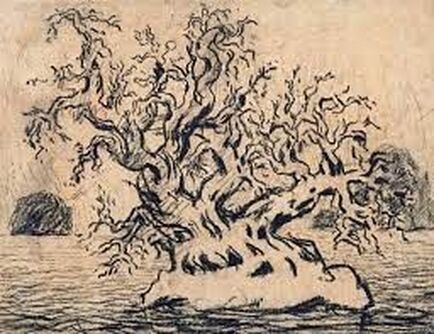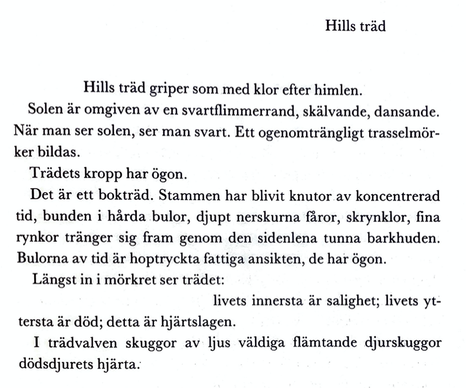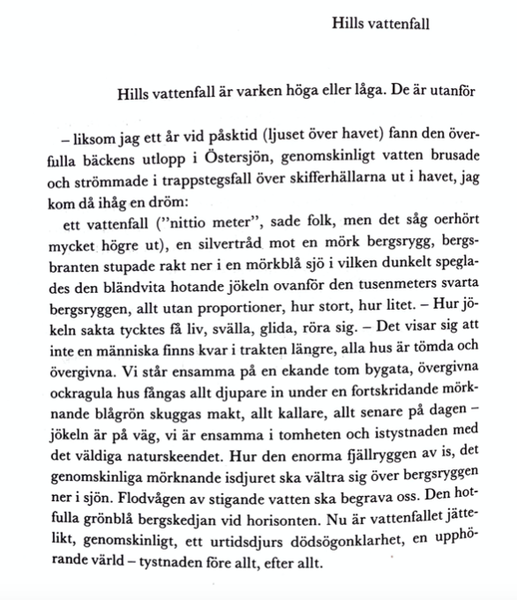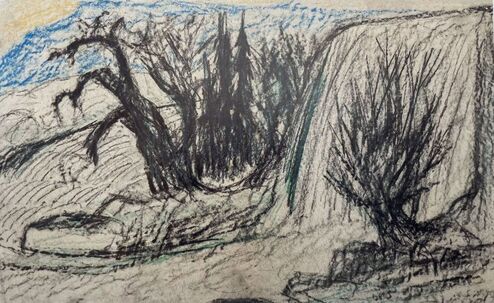|
Swedish: Hill’s Tree Hill’s tree grasps for the heavens as with a claw. The sun is surrounded by one black-shimmering, trembling, dancing. When one sees the sun, one sees black. An impenetrable cluster-darkness manifests. The tree’s body has eyes. It is a book-tree. The trunk has become knots of concentrated time, bound in tough clumps, deeply eroded furrows, creases, fine wrinkles force themselves forward through the silky-smooth thin bark-skin. The clumps of time are compressed impoverished faces, they have eyes. Farthest inside the darkness the tree sees: the innermost of life is salvation; the outermost is death; this is the heart’s beat. In the tree vaults, shadows of light, mighty flickering animal-shadows, the death-animal’s heart. Birgitta Trotzig, translated by Bradley Harmon Hill’s Waterfall Hill’s waterfall is neither high nor low. It is beyond – like when I one year at Eastertime (the light across the sea) found the overflowing brook’s outlet in the Baltic, transparent water roared and streamed down staircase waterfalls over the slate rocks out into the sea, I then remembered a dream: a waterfall (“ninety meters,” people said, but it looked immensely higher), a silver thread against the dark back of a mountain, the precipices plummeted straight down into a dark blue lake which dimly reflected the blinding white looming iceberg above the thousand-meter black ridge, all without proportion, however big, however small. – How the iceberg seemed slowly to come to life, to swell, to glide, to move. – It turns out that not a man is left in that neighborhood any longer, all the houses are emptied and abandoned. We stand on an echoing empty city street and stare out alone, abandoned ochre houses trapped deeper and deeper under the power of a progressively darkening blue-green shadow, colder and colder, later and later in the day – the iceberg is on its way, we are alone in the emptiness and the silence of the vast natural world. How the huge folding ridge of ice, the translucent darkening icebeast will roll over the ridge into the lake. The floodway of rising water shall bury us. The menacing green-blue mountain range on the horizon. Now the waterfall is giant, translucent, a primeval beast’s death glare, a world ceasing - the silence before all, after all. Birgitta Trotzig, translated by Bradley Harmon These poems are Birgitta Trotzig's prose poem collection, Anima, 1982. Birgitta Trotzig (1929–2011) is one of the twentieth century’s most revered Scandinavian authors. She wrote across many genres and is particularly acclaimed for the 1982 prose-poem collection Anima, the 1972 novel The Malady, and her 1985 masterpiece The Marsh King’s Daughter. She was elected to the Swedish Academy in 1993 and awarded many of the major literary prizes in Sweden. Her work has been translated into over a dozen languages. Bradley Harmon (b. 1994) is a writer, translator, and scholar of Scandinavian and German literature, philosophy, and film. His translations have appeared in many literary journals and his book translations include Birgitta Trotzig’s The Marsh King’s Daughter, Katarina Frostenson’s The Space of Time, and Monika Fagerholm’s Who Killed Bambi? He was invited to the 2021 Översättargruvan translation workshop in Sweden, placed second in the 2022 Anne Frydman Translation Prize, and is a 2022 ALTA Emerging Translator Fellow. He lives in Baltimore, where he's completing a PhD at Johns Hopkins University.
0 Comments
Your comment will be posted after it is approved.
Leave a Reply. |
The Ekphrastic Review
COOKIES/PRIVACY
This site uses cookies to deliver your best navigation experience this time and next. Continuing here means you consent to cookies. Thank you. Join us on Facebook:
July 2024
|







